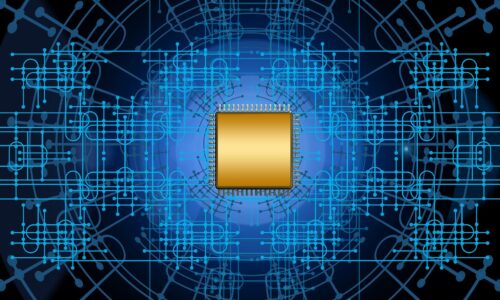
What is Quantum Computing, and is it a security threat?
What is Quantum Computing?
In essence, quantum computing is a computational system that allows for an outcome to be predicted based on a summation of states, rather than be derived from a series of investigations into the physical binary states of all data required to define the outcome.
In this way, the algorithms involved can define the outcome before the physical measurement of an object and its state.
Example concept 1 –
Think of a light switch in a cellar as an example. If you walk into the room and can see, you already know the light is on, the pre-existing factors determine it is on without needing to measure the factors that drive the outcome or review the physical state of the switch itself.
Example concept 2 –
As another example – assume for a second you have a locked door and a thousand keys to hand that might or might not fit, being able to try all the keys at the same time and in a fraction of a second is a clear advantage, in the same time period you would have historically tried one key, you’ll have now unlocked the door.
A move from binary to Qbit and superposition –
Quantum computing differs from a traditional logic and binary on/off assessment of data, a Qbit for example can indeed be on or off. Still, it can also be assumed to be both simultaneously (a state of superposition). This means superposition is when an object exists in multiple states at the same time and is only considered a single state at the point of measurement.
The use of superposition allows quantum computers to derive a result by simultaneously looking at all contributory factors, rather than serially analysing data and each respective outcome to reach a result.
Objects in a state of superposition can also have a relational state to other objects (an entanglement) meaning that by knowing the state of one object (without the need for further processing) you will also know the state of the other.
For people outside of the computer world, the benefits in quantum computing may not be instantly apparent, but by understanding the capability that the parallel computational process provides, the power behind this computer science can definitely be appreciated.

How do Quantum Computers work?
Quantum computers perform calculations based on the probability of an object’s state before it is measured – instead of just 1s or 0s – which means they have the potential to process exponentially more data compared to classical computers.
Classical computers carry out logical operations using the definite position of a physical state. These are usually binary, meaning its operations are based on one of two positions. A single state – such as on or off, up or down, 1 or 0 – is called a bit.
In quantum computing, operations instead use an object’s quantum state to produce what’s known as a qubit. These states are the undefined properties of an object before they’ve been detected, such as the spin of an electron or the polarisation of a photon.
Rather than having an exact position, unmeasured quantum states occur in a mixed ‘superposition’, not unlike a coin spinning through the air before it lands in your hand.
These superpositions can be entangled with those of other objects, meaning their final outcomes will be mathematically related even if we don’t know yet what they are.
The complex mathematics behind these unsettled states of entangled ‘spinning coins’ can be plugged into special algorithms to make short work of problems that would take a classical computer a long time to work out… if they could ever calculate them at all.
Such algorithms would help solve complex mathematical problems, produce hard-to-break security codes, or predict multiple particle interactions in chemical reactions.

What are the security concerns?
Quantum computers promise exponential increases in computational analysis and brute force bandwidth. This has many connotations for medicine, chemistry, AI, simulation and many other industries. However, that same computational brute force can also be applied to the task of breaking encryption.
We can expect online security for example to change the rules substantially, and allow login attempts to have a much longer delay before trying again, and additional validation all becoming more important as a single key has less value.
But what about encrypted transmissions, banking and message privacy? Quantum computing for all but those that can afford it will likely mean that privacy will change and will be under more threat than ever before.
With the power of a quantum computer the big targets for security and privacy issues are more likely to initially centre around finance organisations and government data, but the havoc that could be unleashed when used against commercial organisations and social media, could also manipulate or remove services, and therefore our ability to believe the things that we see and hear online, and could well see a shift in the way we interact online.
So, it’s already recognised that quantum computing represents a risk to current encryption, to not only security but also crypto-currency. This shouldn’t cause concern as people have been working towards better authentication since the early days of quantum Computing.
Quantum Computing, when considered as available hardware, raises a number of questions, and so will inevitably force some evolution in the computing and security industries:
- Are there additional threats and risks that quantum Computing enables?
- Can quantum computing be abused as a technology and used to disrupt/disable communications. data transfer and commercial transactions?
- Are there specific security concerns around quantum computing?
- Are there potential issues for Crypto Currency?
These questions and many more need to be asked, but ultimately, new technology and exponential increases in performance are disruptive and those that have the technology (whilst distribution) typically hold the power. However, over time as things become more mainstream, we adapt and evolve our behaviour and the tools we use to mitigate the risks and align our expectations.
Security questions:
- Will security change? Certainly.
- Will our perception of privacy change? Most likely.
- Will new technologies and systems develop to negate common and specific issues? I’m sure they will.
Does a leap in technological capability mean that progress already moving false in its capability will be further accelerated? Of course.

A change to Quantum Computing
Change often brings concerns and fears, after all, fear of change is a very natural and human instinct. However, our ability to adapt, overcome and endure is equally human.
In the future, privacy may become more about content ownership and change control, evidencing its authenticity and origins rather than how real the content looks on a superficial level.
Summary
With numerous companies including Google, IBM, D-wave, Rigetti, Intel and others looking to stabilise, commercialise and develop quantum processors and computing platforms for near-future availability, and with functional prototypes already starting to prove viability, it may just be a matter of time until quantum computing is no longer the next big thing and becomes just another link in the evolutionary chain of computing technologies.
After all, the first computers were mechanical, then valve and contactor operated, before transistors and then miniaturised transistors came into play. There have already been many technology shifts and will likely be many more as technology continues to evolve.
Thank you for reading. For more computing-related guides and industry insights please visit our blog section.
Resources:
Text: ‘How do quantum computers work’, source: https://www.sciencealert.com/quantum-computers
Image: ‘What is Quantum Computing’, source: Stephen Shankland/CNET



